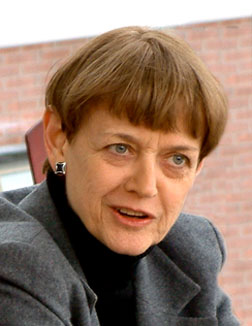
|
July 12, 2006 |
Stallings Named Director of Watson Institute for International Studies
Barbara Stallings, an international political economist and senior member of the Watson Institute research faculty since 2002, has been appointed the new director of the Watson Institute for International Studies at Brown University. Stallings will begin her new duties immediately. | |||
|
Brown University Home |
PROVIDENCE, R.I. — Barbara Stallings, a political economist who specializes in the field of international development, will become the Howard R. Swearer Director of the Watson Institute for International Studies at Brown University. Her appointment was announced today by Brown University Provost David I. Kertzer. Stallings, the William R. Rhodes Research Professor of International Relations at the Institute, will begin her work immediately. As director, Stallings will provide intellectual leadership and strategic direction to the Watson Institute's research and teaching on contemporary global issues. She succeeds Thomas J. Biersteker, who headed the Institute for the last 12 years. 
“At a time when global issues and international studies command so much attention in so many disciplines, the Watson Institute has an increasingly vital role to play in the intellectual life of the University,” said Kertzer. “Barbara Stallings has the academic background and practical experience to lead the Institute with purpose and confidence.” The Watson Institute is a legacy of Thomas J. Watson Jr., a 1937 graduate and former vice chancellor of the University, who served as U.S. ambassador to the Soviet Union during the Carter administration. In the early 1980s, Watson helped establish Brown's Center for Foreign Policy Development, a research enterprise focused on nuclear disarmament and the search for international peace and stability. That Center became part of the Institute for International Studies, which was renamed in Watson's honor in 1991. Today, in the post-Cold War era, the Watson Institute supports the activities of faculty, students, visiting scholars and policy-makers focused on critical global issues in four areas: security; political economy and development; political identity and culture; and the environment. The Watson Institute is the intellectual home of the concentration in international relations, one of the largest undergraduate academic programs at the University. It has an academic staff of 74 faculty, fellows, research associates and postdoctoral fellows; 90 faculty associates drawn from across the University; and an administrative staff of 25. Barbara Stallings A graduate of Mount Holyoke College, Stallings has earned two doctorates: in political science from Stanford University, and in economics from the University of Cambridge. Her work has focused on economic reform and development, particularly in Latin America and East Asia; finance for development; development strategy; and international political economy. Prior to joining the Watson Institute in 2002, Stallings served as director of the Economic Development Division of the United Nations Economic Commission for Latin America and the Caribbean in Santiago, Chile. She was previously professor of political science at the University of Wisconsin�Madison, where she also served as director of the Global Studies Research Program, director of the Latin American Studies Program, and associate dean of the graduate school. Stallings has lectured around the world and acted as adviser to several governments and international agencies. She is author or editor of 11 books and numerous chapters and articles. Most recently, she co-authored Finance for Development: Latin America in Comparative Perspective (Brookings Institution, 2006). She has also served on the editorial boards of several journals, including Studies in Comparative International Development, Oxford Development Studies, Competition and Change, Oxford Companion to Politics of the World, International Studies Quarterly, American Journal of Political Science, and Latin American Research Review. At the Watson Institute, Stallings has been director of the Political Economy and Development Program, co-director of Brown's Graduate Program in Development, and co-director of the Brown-Brandeis APEC Studies Center. She is also the editor of Studies in Comparative International Development, an international development journal housed at the Institute. "The world today faces daunting problems of poverty, environmental degradation, and conflict," Stallings said. "I look forward to leading the Watson Institute's work, bringing academics and policy-makers together to analyze these problems and propose solutions." The Swearer Directorship of the Watson Institute is named for Howard R. Swearer, the 15th president of Brown University and founding director of the Institute. Stallings' appointment was approved by the Brown Corporation's Advisory and Executive Committee. Stallings' appointment follows an international selection process chaired by Kertzer. Committee members included Peter R. Andreas, associate professor of political science and associate professor (research) at the Watson Institute; Kathryn S. Fuller, a University fellow and member of the Watson Institute Board of Overseers; Lina M. Fruzzetti, professor of anthropology; Patrick G. Heller, associate professor of sociology and a Dupee faculty fellow at the Watson Institute; Richard Holbrooke, an emeritus member of the Watson Board of Overseers and former U.S. ambassador to the United Nations and to Germany; Pauline Jones-Luong, associate professor of political science; Ross Levine, professor of economics and a Dupee faculty fellow at the Watson Institute; Catherine A. Lutz, professor of anthropology and professor (research) at the Watson Institute; David E. McKinney, a University fellow and vice-chairman of the Watson Institute Board of Overseers; and Osvaldo E. Sala, professor of biology and director of the Environmental Change Initiative. More information is available at www.watsoninstitute.org. ###### | |||